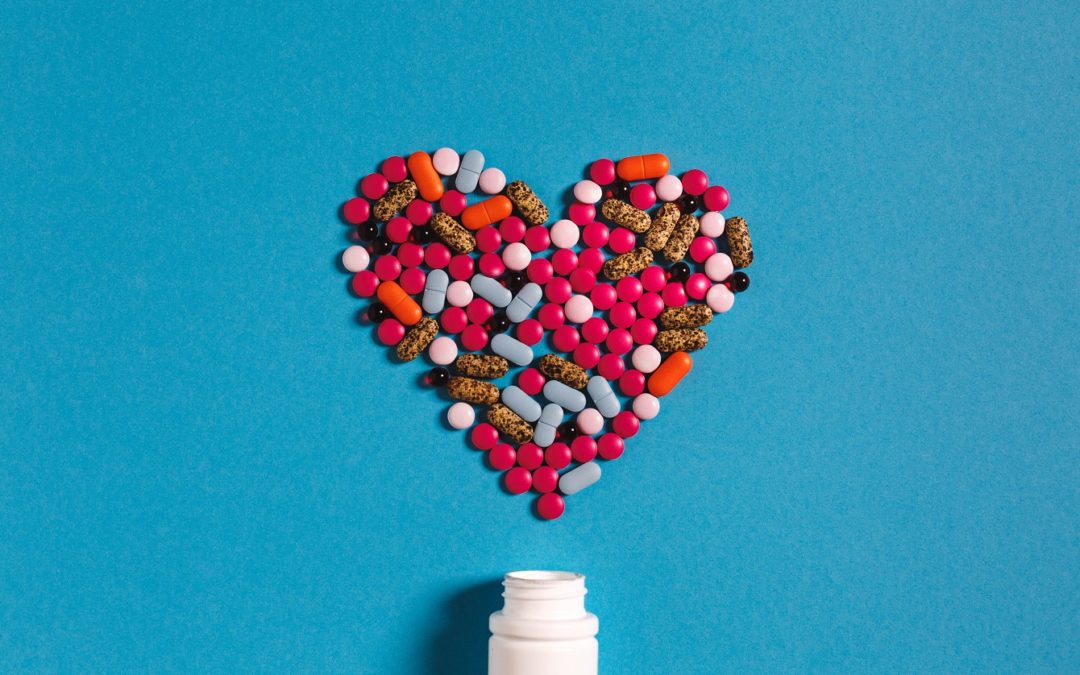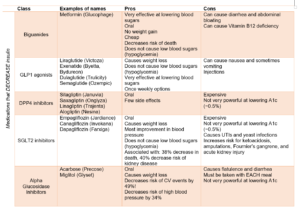What I’m about to explain to you is actually more common sense than anything else.
Don’t worry, I’m going to give you an EDUCATION. After all, I am a medication expert who teaches the use of medications to physicians and students.
But, after you read this, it’s going to be really clear how these medications work and whether or not you want to take them.
Many, if not most, people I meet in my practice don’t know what most of their medications are for or how they work. And they take multiple medications, sometimes as many as 20 or more.
And there is a lot of shame around that. They think they SHOULD know, but no one’s ever taken the time to explain it to them in a way they understand it. 🤷♂️
So this post is all about empowering you so that you can look at your diabetes medications and weigh the pros and cons for yourself.
Let’s dive in! 🏊♂️
There are essentially 2 groups of diabetes meds used in the United States and many other western countries. I like to present them to you this way because it’s simple but so much more meaningful than how most doctors think of them.
Remember, we are talking about TYPE 2 DIABETES here, so this information is not applicable for those with Type 1, unless they have BOTH. Yes, that is a thing. When you give a person with Type 1 Diabetes insulin, it saves their lives because they don’t make insulin naturally at all. But if this person eats like most westerners (aka around the clock), they will be injecting insulin around the clock, which allows for weight gain and insulin resistance. KABOOM: Now you have Type 1 AND Type 2. ☹
Let’s start with establishing that Type 2 is a disease of TOO MUCH INSULIN. If you want to refresh or learn this in more detail, read this post for the whole story.
So the 2 groups of meds for Type 2 Diabetes are:
- Medications that increase your insulin levels
- These essentially make your diabetes WORSE because they make the CAUSE of Type 2 Diabetes worse. More insulin means more insulin resistance, which requires more insulin. It drives itself.
- You can tell if the medication increases insulin levels because it usually causes weight gain and LOW blood sugars (hypoglycemia).
- These drugs are associated with an increased risk of cardiovascular events (strokes, heart attacks) and other serious diabetes problems like kidney failure.
- Medications that decrease your insulin levels
- These ADDRESS the CAUSE by allowing insulin levels to fall, which IMPROVES insulin resistance, the main driving factor of Type 2 Diabetes.
- These drugs are weight neutral or cause weight loss and do not cause hypoglycemia on their own.
- These are associated with IMPROVED survival, DECREASED risk of CV events, and DECREASED risk of other diabetes problems.
Think about this: there are 2 people with Type 2 Diabetes who have an A1c of 6 % (42 mmol/mol). One does not take any medications at all. The other takes 160 units total of insulin every day to control her blood sugars. Would you think of them as the same? Absolutely not, right? The first person has mild diabetes, while the other person has severe diabetes. Their risk of having a heart attack or stroke is completely different. So why is it that we focus so much on the A1c when it comes to diabetes control?
To start, take a look at the following tables and find the medications that you take (open in a new window so you don’t lose your place):
Medications that Increase Insulin
Nearly 30% of Americans with Type 2 Diabetes are prescribed insulin. How is this a good idea when the CAUSE of insulin resistance is too much insulin?
What’s more is that there are multiple studies that strongly associate increased insulin levels with significantly increased rates of death and cardiovascular events like strokes and heart attacks, not to mention the staggering rates of emergency room visits and hospital admissions related to low blood sugars (hypoglycemia).
The higher the insulin dose, the higher the risk of death. And the longer insulin is taken, the greater the risk as well. Two different studies (1996 Quebec Cardiovascular Study and 2011 study by Colayco et al) found a 279% increased risk of death and a 265% increased risk of death when insulin is used.
What’s almost guaranteed is that once a person starts using insulin, typically doses increase over time as well as the number of injections required to keep blood sugars down. More frequent blood sugar monitoring is needed, and the risk of low blood sugars goes up as well. Once insulin is started, it is rarely stopped.
Additionally, the cost of insulin is a major public concern, as recent reports show that 1 in 4 people with diabetes are rationing or even stopping their insulin due to cost.
The facts are so astonishing that it’s a wonder that insulin is prescribed at all, let alone considered a first-line therapy for Type 2 Diabetes. Even from a basic standpoint, it’s a fair question to ask your doctor why you would need a medication that causes weight gain, the last thing most people with Type 2 Diabetes want or need.
So what about all the other medications? Remember the category of medications that increase insulin levels in the body? It is not a coincidence that the meds that cause weight gain and low blood sugar have similar associations with increased risk of death. These would be the sulfonylureas (glipizide, glimepiride, and glyburide) and pioglitazone.
Medications that Decrease Insulin
Let’s turn our attention to the medications in the second table, which decrease insulin levels in the body.
Metformin would be the mainstay of Type 2 Diabetes treatment. Probably no one has ever explained this to you, but it stops your liver from cranking out glucose (sugar) and dumping it into your blood stream. It also helps your body tissues take up glucose. Because it is so effective at reducing blood sugars, it thereby lowers insulin levels. Not to mention, it’s cheap as dirt, does not cause low blood sugars, and can help people lose weight. It is one of the only agents available that has been shown to REDUCE the risk of death. It’s biggest downside is that many people cannot tolerate the diarrhea and bloating that can happen with metformin.
Most of the other medications on this table are brand name only and pretty costly (e.g., Januvia, Victoza, Trulicity, Jardiance, Invokana). Drugs like Jardiance and Victoza have been getting a lot of press because they are showing impressive reductions in cardiovascular events and kidney disease. In one trial, people taking Jardiance saw a 38% reduction in the risk of death.
Is it a coincidence that these medications that reduce insulin levels have the opposite effect on risk of death and other diabetes problems as meds that increase insulin levels? I don’t think so.
Also, these meds do not cause low blood sugar on their own and usually lead to weight loss.
Overall, they are pretty well tolerated, with the exception of the class of meds that includes Jardiance and Invokana, which cause glucose to leave the body in the urine by blocking the kidneys from holding onto it. Some pretty serious possible adverse effects have been reported: increased infections (urinary tract and genital yeast), ketoacidosis (super high glucose levels that can lead to coma and death), amputations, Fournier’s gangrene (life-threatening infection of the perineum and genitals), and acute kidney failure. 😯
I know, it’s alarming to say the least.
One fascinating observation about this category of meds is that the alpha glucosidase inhibitors (acarbose and miglitol) yielded similarly impressive outcomes in a 2003 trial: 49% reduction in cardiovascular events and 34% reduction in hypertension. Why have these fallen out of style, rarely prescribed? Because their A1c reductions are modest. They just keep people alive, which is apparently not as important as the A1c lowering effect. 🤔
When you take a closer look at the medications we use to “control diabetes,” it seems pretty dismal. NONE of these medications actually CORRECT the CAUSE, which is our diet. When you fail to correct the cause, insulin resistance just gets worse over time and more and more medications are needed to bring blood sugar down.
And MANY of these medications propel diabetes FORWARD, by raising insulin levels higher. Higher insulin levels mean higher insulin resistance.
We want to believe that controlling blood sugars will guarantee that we will avoid all the problems that can happen with diabetes, but the evidence casts more than a shadow of a doubt.
But this would only make sense, right? Almost common sense. Why would we expect that diabetes would get better if we keep doing the things that CAUSED it in the first place?
If you’re facing the facts here, and it worries you, TAKE ACTION! You can turn this around by taking a look at how food can be your medicine. Many dietary strategies have been shown to control or even reverse Type 2 Diabetes.
This is what I specialize in. I know, I’m the pharmacist that wants to help you GET OFF your meds. It seems like an impossible goal, but I want to tell you that IT IS POSSIBLE. FOR YOU.
Let’s chat. I can give you my expert opinion on what needs to happen to help you reach your goals. Fill out the form below for more information:👇




